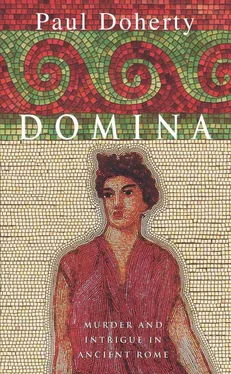Paul Doherty - Domina
Здесь есть возможность читать онлайн «Paul Doherty - Domina» весь текст электронной книги совершенно бесплатно (целиком полную версию без сокращений). В некоторых случаях можно слушать аудио, скачать через торрент в формате fb2 и присутствует краткое содержание. Год выпуска: 2012, ISBN: 2012, Издательство: Headline, Жанр: Исторический детектив, на английском языке. Описание произведения, (предисловие) а так же отзывы посетителей доступны на портале библиотеки ЛибКат.
- Название:Domina
- Автор:
- Издательство:Headline
- Жанр:
- Год:2012
- ISBN:9780755350490
- Рейтинг книги:3 / 5. Голосов: 1
-
Избранное:Добавить в избранное
- Отзывы:
-
Ваша оценка:
- 60
- 1
- 2
- 3
- 4
- 5
Domina: краткое содержание, описание и аннотация
Предлагаем к чтению аннотацию, описание, краткое содержание или предисловие (зависит от того, что написал сам автор книги «Domina»). Если вы не нашли необходимую информацию о книге — напишите в комментариях, мы постараемся отыскать её.
Domina — читать онлайн бесплатно полную книгу (весь текст) целиком
Ниже представлен текст книги, разбитый по страницам. Система сохранения места последней прочитанной страницы, позволяет с удобством читать онлайн бесплатно книгу «Domina», без необходимости каждый раз заново искать на чём Вы остановились. Поставьте закладку, и сможете в любой момент перейти на страницу, на которой закончили чтение.
Интервал:
Закладка:
Agrippina was most interested in Claudius’s relationship with Messalina. She listened avidly to the tales of her rival’s amorous exploits whilst Claudius was growing more and more puritanical. He banned prostitutes from Rome. When he discovered that the husband of his elder daughter, Antonia, was more interested in pretty boys, Claudius sent soldiers to his house: they caught the miscreant in bed with one of his lovers and promptly stabbed both to death.
Nevertheless, I warned Agrippina that Messalina’s influence over Claudius did not appear to be waning. She was ruthless and sly in exploiting her husband’s fears and growing superstition. One day as Claudius entered her court, a litigant came running up and begged for an audience.
‘Your Excellency,’ he fawned. ‘Take care this day, for I dreamt you were assassinated.’
Claudius, of course, was full of concern and begged the man to describe the would-be assassin: the cunning litigant turned and pointed to his rival waiting in the court. Claudius was taken in by this nonsense and the poor victim was immediately hustled away and executed on a fictitious charge of treason. Messalina was equally successful in using the same method to despatch a senator she hated. One morning Narcissus, the powerful freedman, burst into the Emperor’s bedchamber. Sweaty and stricken, he threw himself on his knees and told the Emperor of his dream in which Messalina’s hated senator had forced his way into the palace and stabbed Claudius to death.
‘I have dreamt a similar dream,’ Messalina divulged.
Claudius heard them out, not yet fully believing, until a chamberlain promptly arrived to say that the very same senator — whom of course Messalina had secretly invited to the palace — had tried to force his way into the imperial chambers. It was confirmation enough for Claudius: orders were issued and, by noon, the senator concerned was forced to take his own life.
Agrippina listened to this story and asked me to repeat it several times.
‘A clever ruse,’ she murmured. ‘A very clever ruse. If only poor Passienus was better, I’d travel to Rome myself to see what was happening.’
Poor Passienus was by now in a terrible way. His mind was wandering and, for some strange reason, he had fallen in love with a beech tree in his garden at Tusculum. He would embrace the trunk and kiss it, ordering his slaves to water the tree only with the finest wine from his cellars. He would sit and talk to it and sleep in its shade, and, late one afternoon, he died there. Agrippina mourned dutifully, and then had the body cremated and buried in the family tomb on the Appian Way. Once the funeral was over, Agrippina announced it was time for her to return to Rome.
Chapter 12
‘What times! What manners!’
Cicero, In Catilinam: I, iAgrippina used Passienus’s wealth to set up in luxury in her house on the Via Sacra. Once again she was visited by the powerful and the mighty Claudius himself came, to eat and drink, and listen owl-eyed to Agrippina’s lectures on Roman history. He would fall asleep, mouth open, and a slave would come and tickle his throat to get rid of the excess food and wine. Once this was achieved, two Nubian slaves lifted him up and carried him back to his litter.
Oh, Agrippina was still plotting. I sometimes ask myself why I stayed with her but. . I loved the woman! In spite of all her wrongdoing and, yes, her killings, I admired her courage, and the fact that, once she had given her heart, she loved without compromise or constraint. She reminded me of a beautiful eagle, wings back, plunging down to the earth; once she had chosen her quarry, only death itself could stop her. During those early months after her return to Rome, Agrippina, like an eagle, perched on a branch, high above the scheming politics of the court, watching, waiting for her opportunity.
Claudius was undoubtedly tiring of Messalina’s strident ways, her jealousy, her fury when her will was blocked. So Agrippina prepared to make her first move. The secular games were being held in Rome, and Nero was invited to take part whilst Agrippina joined Claudius in the imperial box. Messalina and her coterie were also there, and Agrippina watched them avidly, fascinated by Messalina’s open flaunting of her favourites. One of these, Vitellius, Governor of Palestine, was even allowed to carry one of Messalina’s slippers next to his heart as a token of his undying love for her. We all settled down, and watched Nero, aged eleven, and Britannicus, aged nine, lead the procession into the arena. Both boys, their hair dressed in decorative garlands, carried long, sharp javelins, a bow and quiver over their backs and around their necks chains of gold. When Nero came forward and saluted the Emperor, he was greeted by thunderous, rapturous applause, a sharp contrast to the courteous cheers and polite hand claps that greeted Britannicus: Domina had hired a special claque and they did a brilliant job. Messalina turned in her chair and glared at Agrippina, who smiled icily back, her message clear: Agrippina, daughter of Germanicus, had returned to Rome and her war with Messalina had only just begun. Afterwards I advised caution, but as usual Agrippina just ignored me.
‘What can the bitch do?’ she taunted. ‘Attack me? Attack the grandson of Germanicus? Rome would not tolerate it. It’s time we went to work, Parmenon.’
The invitations to Claudius and his freedmen Narcissus and Pallas increased, but at these evenings Agrippina began to look anxious and troubled, refusing to tell Claudius the reason. At last she produced Styges, an Egyptian soothsayer, a mountebank who could convince even prudent men that he had the gift of seeing the future. At first Agrippina pretended to be reluctant to let her self-styled seer inform the Emperor of what he had divined. Only when Claudius cleared the chamber and took the most solemn oaths, did Styges reveal that he had dreamed the husband of Messalina was in great danger.
‘Not Messalina herself?’ Claudius asked.
‘No, Excellency, her husband.’
‘But, but. .’ Claudius stammered. ‘What can be done? What shall I do?’
Agrippina reminded Claudius of the oath he had taken not to tell anyone of the seer’s prophecy. The Emperor, now hooked like the fish he was, asked Agrippina for advice.
‘At the moment the danger is some time off,’ Domina replied. ‘But, Excellency, you must plan how to deal with it. If Messalina. .’ She let her words hang in the air.
‘If Messalina what?’ Claudius demanded.
‘If Messalina could be encouraged to take another husband, just for a while. .’
Claudius blinked and glanced at me. ‘Wh- wha- what do you think, Parmenon?’
I stared at my mistress, who was acting to the full her role as concerned Roman matron. She held my gaze, and I glimpsed the laughter in her eyes.
‘The most important thing, your Excellency,’ I insisted, ‘is the health and safety of your sacred person. That’s why you must keep this warning to yourself. If it became public knowledge. .’
Claudius bit his lip.
‘Think of it this way, your Excellency,’ I continued, ‘danger threatens on all sides, but that is part of your sacred duty. Didn’t the divine Caesar, the noble Augustus, and all the great heroes of Rome have to face danger?’
Claudius nodded. Oh, in many ways he was such a great fool!
‘What Domina Agrippina wishes to ensure,’ I explained smoothly, ‘is that there is protection between you and that danger.’
Claudius poked me sharply in the chest. ‘You could become Messalina’s husband for a while, but no bed sport, mind you.’ He threw his head back and bellowed with laughter at the look of consternation on my face.
‘I was only joking,’ he wheezed. ‘Messalina would never have anything to do with someone who was not only of inferior rank but ugly with it!’
Читать дальшеИнтервал:
Закладка:
Похожие книги на «Domina»
Представляем Вашему вниманию похожие книги на «Domina» списком для выбора. Мы отобрали схожую по названию и смыслу литературу в надежде предоставить читателям больше вариантов отыскать новые, интересные, ещё непрочитанные произведения.
Обсуждение, отзывы о книге «Domina» и просто собственные мнения читателей. Оставьте ваши комментарии, напишите, что Вы думаете о произведении, его смысле или главных героях. Укажите что конкретно понравилось, а что нет, и почему Вы так считаете.












